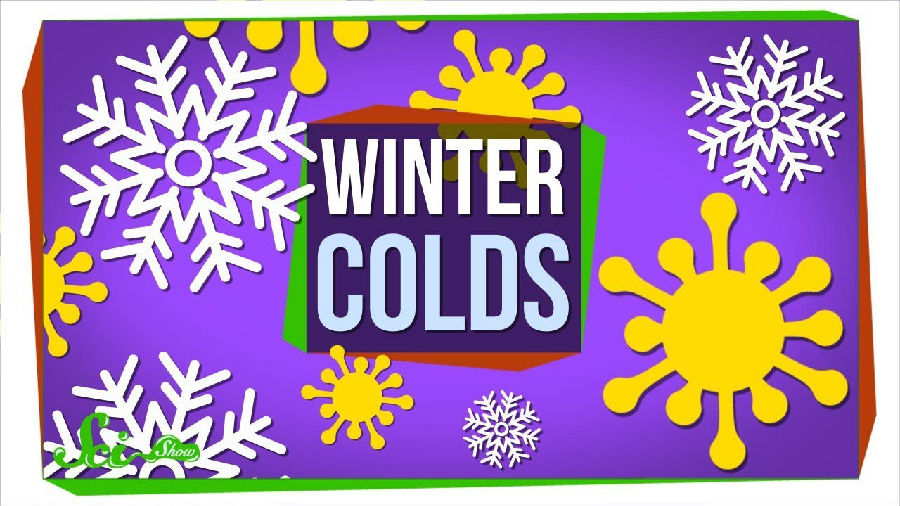At some point during your childhood, you were probably told not to go out in cold weather with wet hair,
童年时,家长会告诉你不要在冬天顶着一头湿发出门,
or without bundling up, because "you'll catch a cold."
或者穿暖和了再出去,因为“你会感冒的。”
But we know the common cold is caused by viruses, not chilly air.
但我们都知道感冒是由病毒引起的,而不是空气冷。
So why does this old wives' tale hang around?
所以为什么这种无稽之谈流传至今呢?
It's probably because colds are more common in colder weather.
大概是因为冬季感冒更常见吧。
But as far as scientists can tell, that's not because you feel cold.
但据科学家所说,感冒并不是因为你感到寒冷。
There are lots of better explanations for why colder weather increases your odds of getting sick.
对于为什么冬季感冒几率会增加,还很多更好的解释。
The connection between temperature and illness isn't simple.
温度和疾病之间的联系并不简单。
Even though colds and other respiratory illnesses are more common in colder months,
虽然感冒和其他呼吸系统疾病在冬季更加常见,
not all of them spike in the dead of winter, when it's coldest.
当天气寒冷时,并不是所有这类疾病都爆发于隆冬之际。
And the most direct studies we've done haven't found a relationship between feeling cold and catching a cold.
在我们的许多直接研究中,我们也并未发现寒冷和感冒之间的关系。
For example, in a randomized controlled trial published in 1958,
例如,在1958年发布的随机对照试验中,
researchers divided nearly 400 people into rooms that were either 27 degrees, 16 degrees, or -12 degrees Celsius.
研究者将近400人分到不同的房间,房间温度要么是27度、16度或零下12摄氏度。
Then they put virus-infected mucus up some of their nostrils.
然后他们将被感染的粘液放在一些人的鼻孔之上。
But the temperature didn't make a difference — in every room,
但温度并未使情况有所不同,
just over a third of the volunteers that received the infected mucus got sick.
每个房间内,在黏上了感染粘液的自愿者中,有超过三分之一的人生病了。
One study from 2005 did find that people who had their feet soaked in freezing cold water
2005年的一项研究确实发现那些将脚泡在冷水中的人
reported more cold symptoms in the days afterward compared to a control group.
和那些实验对照组中的人相比,几天后他们确实出现了更多的感冒症状。
But it's hard to tell how much of that was influenced by subjects thinking they'd be more likely to get a cold.
但考虑到他们更容易感冒,所以很难辨别受其影响的程度有多大。
If feeling cold really does make you more likely to get sick, there are a couple of ideas that might explain it.
如果感觉寒冷确实让你更容易生病的话,有些想法或许可以作出解释。
One hypothesis argues that even though the cold doesn't weaken your immune system overall,
有种假设认为即使寒冷没有减弱你的免疫系统,
it might lower the defenses in your respiratory system, specifically.
它也有可能降低你呼吸系统地防御能力。
And in a paper published in 2016 in the journal Medical Hypotheses,
2016年发表在《医学假说》杂志中的一篇论文中
a microbiologist suggested that viruses lie dormant for extended periods of time in our bodies,
一名微生物学家暗示身体内的病毒会长时间潜伏,
then get activated when the temperature drops.
气温降低会激活它们。
But there are lots of problems with those ideas.
但那些想法也存在很多问题。

And the vast majority of research shows that simply being cold doesn't make you more vulnerable to catching colds.
大部分研究显示寒冷是不会让你脆弱到感冒的。
Instead, there are other aspects of cold weather that might increase your chances of getting sick.
反而是冬天的一些其他特质可能会增加你感冒的几率。
Like the fact that the air is super dry.
比如冬季天气相当干燥。
Colder weather is associated with lower humidity, because at lower temperatures, the air can't hold as much water.
冬天和低湿度相联系,因为低温时,空气锁不住多少水分。
When humidity is high, the droplets of virus-infected grossness we breathe out or sneeze out or
当湿度高时,我们呼出、喷出或是
cough out of our bodies stay large and drop to the floor relatively quickly.
从体内咳出的病毒飞沫会保持体积且会较快的落在地上。
But in dry air, they break up into smaller particles and can float around for hours.
但空气干燥时,它们会分解成小块并且能够飘在空气之中好几个小时。
Plus, the lack of moisture can dry out the mucus lining in your nose,
再加上,湿度的缺乏能够让挂在你鼻子边的粘液变干,
which might make it easier for viruses to get past that line of defense.
这就让病毒能够轻易通过那条防线。
Another potential problem is that some people don't get enough sunlight in the winter,
另一个潜在问题是一些人在冬季无法得到足够的阳光,
making them run low on vitamin D. Since vitamin D helps power your immune system,
使得维D很容易被耗尽。因为维D能够帮助增强你的免疫系统,
lower levels mean lower defenses against viruses.
而维D的含量低就意味着抵御病毒的能力降低。
And then there's the fact that human behavior changes during colder months.
还有就是冬季人类行为会随之改变。
We're more likely to stay indoors, which means we're more frequently touching stuff infected people touched,
冬季我们更喜欢待在室内,这就意味着我们经常能触摸到那些感冒者所摸过的东西,
and breathing in the remnants of their sneezes.
呼吸着他们打喷嚏时的残留物。
So, researchers are still trying to pin down all the different ways cold weather may or
所以,研究者仍在试图阻止所有那些可能或者不可能由寒冷
may not affect how likely you are to catch a cold.
导致感冒的不同方式。
But the best way to avoid catching one isn't necessarily by throwing on another layer,
但避免感冒的最好方法不是多穿衣服,
or drying your hair before running out the door.
也不是出门前烘干头发。
It's washing your hands with soap, not touching your face with unwashed hands,
而是用肥皂洗手、脏手不要抹脸
and staying away from people you know are infected.
以及远离那些已经感冒的人。
Thanks for watching this episode of SciShow!
感谢收看本期科学秀!
And a special thanks to our patrons on Patreon, who help us keep the heat running all winter,
特别感谢Patreon的赞助人,是你们的提问
and contribute by asking questions like this one.
让一切变得可能。
To submit your own questions, you can head over to patreon.com/scishow.
登录patreon.com/scishow,提出你自己的问题。


